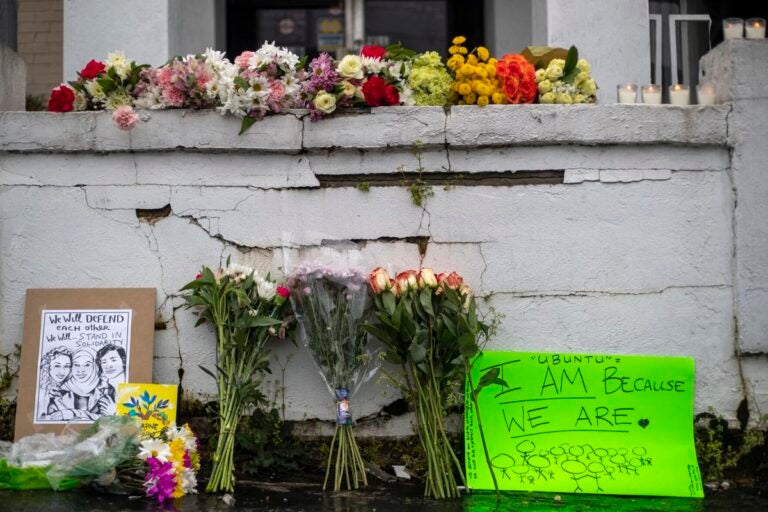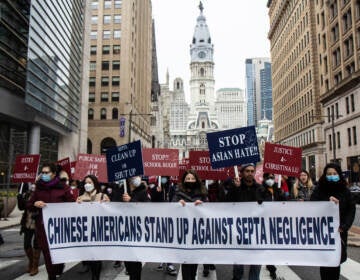Advocates say reluctance to report anti-Asian harassment stems from mistrust
Community advocates say mistrust and doubting whether their experiences “count” are among the reasons many Asian people don’t report incidents of racism.

Flowers and signs are displayed at a makeshift memorial outside of the Gold Spa in Atlanta, Wednesday, March 17, 2021. Police in the Atlanta suburb of Gwinnett County say they've begun extra patrols in and around Asian businesses there following the shooting at three massage parlors in the area that killed eight, most of them women of Asian descent. (Alyssa Pointer/Atlanta Journal-Constitution via AP)
Early in the pandemic but before any major lockdowns, U.S. Rep. Andy Kim of New Jersey boarded a train.
COVID-19, which former President Donald Trump had called the “Chinese virus” and the “Kung Flu,” was beginning to spread rapidly in the U.S. Kim, who is Korean American, said he became the target of his seatmate.
“She immediately freaked out and told me to get away from her, you know, thinking she was going to get COVID,” Kim said. “[She] started yelling at me.”
It was not the last time Kim or a member of his family would face anti-Asian discrimination during what he called a “really tough” year for the Asian and Pacific Islander community.
The second-term Democrat said the coronavirus and its origin in China did not create discrimination against Asian Americans. “But what has happened over the last year is gasoline poured on the fire,” Kim noted, saying people were more confident targeting Asian people in public.
“That is just so scary, the comfort with which people have in this kind of discrimination,” he added.
Law enforcement and community advocates say the number of racist incidents against Asians and Pacific Islanders over the past year are higher than what is being reported. But just how much higher is hard to say, in part because of a patchwork of reporting mechanisms in New Jersey and Pennsylvania.
The issue is compounded by a general mistrust community members say they have of authorities and whether their accounts will be taken seriously.
Just look at how law enforcement is talking about a white man who fatally shot eight people at Atlanta-area spas, including six women of Asian descent, say community leaders and advocates.
Authorities there have said it’s too early to say that the killings were racially motivated.
“We are used to the fact that we don’t get a say of whether what we experience is racism or not, even though, deep inside, we know it’s racism, but we always feel scared … What if I say it’s racism and no one believes me?” said Esther Hio-Tong Castillo.
Castillo is project manager of the Chinese Immigrant Families Wellness Initiative, which is operated through the Philadelphia Chinatown Development Corporation. The initiative launched in January 2020 and is an effort to connect the Asian community to therapists and counselors.
She hopes to offer a different perspective through a recent survey of 200 members of Philadelphia’s Asian and Pacific Islander community.
While people waited to receive COVID-19 vaccines on Wednesday, Castillo and her team asked them if they’d ever experienced racism in their lifetime.
Preliminary results of the survey showed 23% of respondents had either experienced some form of racially fueled harassment in their lifetime or directly knew someone (a friend or relative) who had. Castillo said roughly half of the respondents described being verbally harassed, while another 40% said they experienced physical intimidation, such as pushing or someone getting very close to them in a menacing way.
Castillo said she wanted to capture how much of the racism people experienced was fueled by the COVID-19 pandemic, so she asked people to give an approximate date of when they experienced harassment. About 53% said they were harassed after the pandemic reached the region.
Only one person who experienced harassment said they reported it, a finding that didn’t surprise Castillo, seeing as people were reluctant to even tell her about their experiences.
“They were like, ‘Oh, I’m not quite sure if that counts or doesn’t count,’” she said. “They were like, ‘Oh, it’s not that bad, it’s not bad enough, the suffering is not enough.’”
This was the point in the process where Castillo said she had to do a bit of probing and “give them validation.”
The fear of being believed could explain why other organizations dedicated to investigating racist incidents are not getting complaints.
The Philadelphia Commission on Human Relations said members of the Asian community reported three incidents of racism in 2018; in 2019, they accounted for eight of these incidents, shooting up to 28 incidents in 2020, but did not offer details.
Last April, the Pennsylvania State Police asked the Asian community to come forward and report racist incidents to them, as well as local authorities, promising swift investigations. Lt. William Slaton, the commander of Pennsylvania’s Heritage Affairs section, which investigates these incidents, said only one person reached out to them last year.
Chad Dion Lassiter, executive director of Pennsylvania’s Human Relations Commission, has had similar results.
The commission is tasked with investigating any acts of discrimination and Lassiter said they’ve partnered with local and state community leaders to get the word out. Reports of harassment the commission has received have been limited to Asian people facing discrimination in housing or work, said Lassiter.
“There is a cultural difference; there’s the language phenomenon; there’s the trust versus mistrust; there’s the generational and traditional ways of looking at advocacy where maybe an older generation did not venture along the lines of advocating for themselves,” Lassiter said.
The organization Stop AAPI Hate said it fielded 97 reports of hate incidents in Pennsylvania and another 59 in New Jersey between March 19, 2020, and February 28, 2021 — the fifth and ninth-highest of any states, respectively.
According to data from the New Jersey State Police, there were 39 reported racist incidents targeting Asian people in 2019, the most recent year for which data is available.
But like in Pennsylvania, advocates in New Jersey say official tallies of bias incidents are likely a dramatic undercount since many less serious incidents may go unreported and some people fear coming forward.
“There is this risk of a vicious circle,” said Ronald Chen, a law professor at Rutgers University and co-founder of Jersey Promise, a policy and advocacy organization for Asian Americans.
“To get people to report [racist incidents], members of the community have to trust that the public institutions are going to protect them and are going to help them. There isn’t that level of trust, particularly in the immigrant Asian community,” Chen said.
Kim said, after a year of setbacks, that trust is starting to come back thanks to President Joe Biden, his fellow Democrat.
“I’ll tell you, when President Biden in his speech the other week, made reference to and condemned the violence against the Asian American community, I had people from all over the country calling and emailing me telling me that they feel heard, they feel seen for the first time in a long time. They appreciated that,” Kim said.
Biden and Vice President Kamala Harris are planning to meet with Asian American community leaders during a trip to Atlanta on Friday, which Kim said was another positive step as people continue to process the murders there.
“I can’t stress that enough, how much engagement means to people right now,” Kim said.

Get daily updates from WHYY News!
WHYY is your source for fact-based, in-depth journalism and information. As a nonprofit organization, we rely on financial support from readers like you. Please give today.







